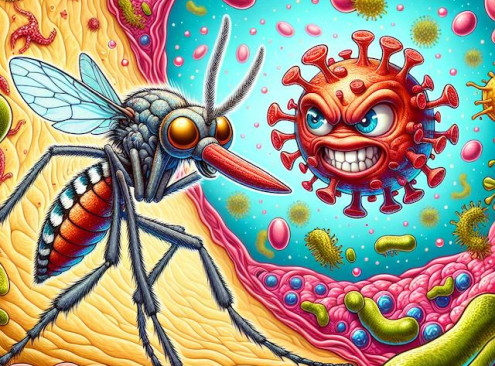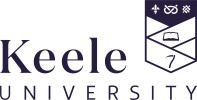© Pint of Science, 2025. All rights reserved.
What do computers, viruses and swearing have in common? They often go together, and they all affect your wellbeing! Join us on a journey through high technology, controversial psychology and evolving biology to find out how we protect us against alien invaders as we turn into aliens ourselves.
A life in space
Jacco van Loon
(Astronomer)
You and I have evolved from simple cells that lived in extreme hardship, through tool-wielding cave dwellers to mod-com addicts and virtual reality seekers. Are we ready for the next step, and swap Earthly inconveniences for a utopian life in space? I will apply current scientific insight to predict what that could be like, now and in the distant future.
Jacco is an astronomer at Keele University and the Director of Keele Observatory and lives just outside the pretty south-Cheshire village of Audlem. They previously worked at the European Southern Observatory, the University of Amsterdam and Cambridge University. Jacco studies all the interesting things that happen inside and around galaxies but is also fascinated by the philosophy of science and the human mind (and that of their cat).
Jacco is an astronomer at Keele University and the Director of Keele Observatory and lives just outside the pretty south-Cheshire village of Audlem. They previously worked at the European Southern Observatory, the University of Amsterdam and Cambridge University. Jacco studies all the interesting things that happen inside and around galaxies but is also fascinated by the philosophy of science and the human mind (and that of their cat).

A deep dive into the architecture and use of supercomputers
Grainne Ross
(HPC engineer)
From simulating the birth of galaxies to accelerating drug discovery, High-Performance Computing (HPC) powers some of the most groundbreaking advancements in science and industry. But what makes a supercomputer so powerful? In this talk, we’ll take a deep dive into HPC architecture—exploring the hardware, networking, and software that drive extreme-scale computing. We’ll also uncover real-world applications, from astrophysics to AI, and discuss how these machines are shaping the future. Whether you're an HPC professional or just curious about supercomputers, this session will unlock the mysteries behind the world's most powerful systems.
Originally from Crewe, I studied at St Thomas More Catholic High School, attended LearnTech College, and completed an IT Technical Solutions apprenticeship. I’m currently a high-performance computing engineer at Hewlett-Packard Enterprise, and I travel across Europe to resolve hardware issues in HPC systems. Alongside my work, I’m pursuing a degree in astrophysics, aiming to specialise in exoplanet research and the search for extraterrestrial life. I plan to leverage my HPC expertise to support my future research.
Originally from Crewe, I studied at St Thomas More Catholic High School, attended LearnTech College, and completed an IT Technical Solutions apprenticeship. I’m currently a high-performance computing engineer at Hewlett-Packard Enterprise, and I travel across Europe to resolve hardware issues in HPC systems. Alongside my work, I’m pursuing a degree in astrophysics, aiming to specialise in exoplanet research and the search for extraterrestrial life. I plan to leverage my HPC expertise to support my future research.

Swearing: A cheap, readily available, calorie-neutral, drug-free means of self-help
Richard Stephens
(Senior Lecturer in Psychology)
Swearing is a fascinating aspect of language. Evidence from Tourette's sufferers and aphasics suggests swearing may not rely on the usual language areas in the brain. While people tend to think of the use of four letter words as a modern phenomenon, the reality is that the earliest recorded uses of these words date back 1,000 years (the F word is one of the most recent, at c1500). Dr Richard Stephens, a psychologist based at Keele University, will be talking about why we swear and specifically his research showing that swearing helps people overcome pain and boosts physical performance.
Dr Richard Stephens is a Senior Lecturer in Psychology at Keele University. Richard researches the psychological benefits of swearing. Richard was the winner of the 2014 Wellcome Trust/ Guardian Science Writing Prize. His first book Black Sheep The Hidden Benefits of Being Bad (Hodder) was the British Psychological Society Book of the Year 2016 in the category Popular Science.
Dr Richard Stephens is a Senior Lecturer in Psychology at Keele University. Richard researches the psychological benefits of swearing. Richard was the winner of the 2014 Wellcome Trust/ Guardian Science Writing Prize. His first book Black Sheep The Hidden Benefits of Being Bad (Hodder) was the British Psychological Society Book of the Year 2016 in the category Popular Science.

Viruses; providing the tools for their own destruction
Emily Levitt
(PhD student)
Emma Widlake
(Postdoctoral Research Associate)
Viruses such as Zika and Dengue are spread to humans and other mammals by mosquitoes. In this talk we will explore how these types of virus infect mosquitoes, examine the stages of the virus life cycle, and discuss different approaches used to control viral transmission from mosquitoes. Journey with us as we explore ways to arm the mosquitoes in the fight against this microscopic threat.
Miss Emily Levitt is a PhD candidate/researcher and Dr Emma Widlake is a postdoctoral Research Associate. We are interested in viruses, such as Zika virus, that are spread to humans by mosquitoes. Our research focuses on understanding more about the virus life cycle and how we can use this to target the spread of these viruses in mosquitoes.
Miss Emily Levitt is a PhD candidate/researcher and Dr Emma Widlake is a postdoctoral Research Associate. We are interested in viruses, such as Zika virus, that are spread to humans by mosquitoes. Our research focuses on understanding more about the virus life cycle and how we can use this to target the spread of these viruses in mosquitoes.

Map data © OpenStreetMap contributors.
